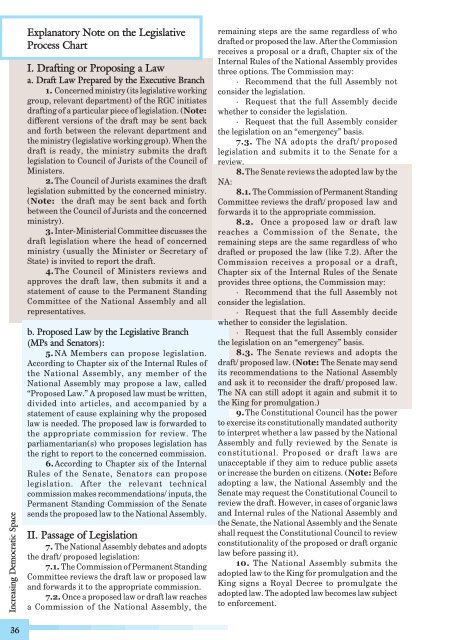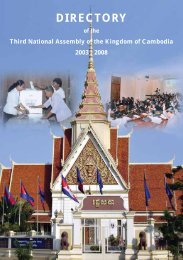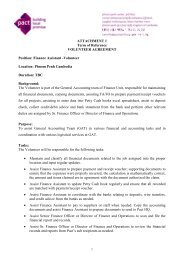Advocacy in Cambodia: Increasing Democratic ... - Pact Cambodia
Advocacy in Cambodia: Increasing Democratic ... - Pact Cambodia
Advocacy in Cambodia: Increasing Democratic ... - Pact Cambodia
Create successful ePaper yourself
Turn your PDF publications into a flip-book with our unique Google optimized e-Paper software.
Increas<strong>in</strong>g <strong>Democratic</strong> Space<br />
Explanatory Note on the Legislative<br />
Process Chart<br />
I. Draft<strong>in</strong>g or Propos<strong>in</strong>g a Law<br />
a. Draft Law Prepared by the Executive Branch<br />
1. Concerned m<strong>in</strong>istry (its legislative work<strong>in</strong>g<br />
group, relevant department) of the RGC <strong>in</strong>itiates<br />
draft<strong>in</strong>g of a particular piece of legislation. (Note:<br />
different versions of the draft may be sent back<br />
and forth between the relevant department and<br />
the m<strong>in</strong>istry (legislative work<strong>in</strong>g group). When the<br />
draft is ready, the m<strong>in</strong>istry submits the draft<br />
legislation to Council of Jurists of the Council of<br />
M<strong>in</strong>isters.<br />
2. The Council of Jurists exam<strong>in</strong>es the draft<br />
legislation submitted by the concerned m<strong>in</strong>istry.<br />
(Note: the draft may be sent back and forth<br />
between the Council of Jurists and the concerned<br />
m<strong>in</strong>istry).<br />
3. Inter-M<strong>in</strong>isterial Committee discusses the<br />
draft legislation where the head of concerned<br />
m<strong>in</strong>istry (usually the M<strong>in</strong>ister or Secretary of<br />
State) is <strong>in</strong>vited to report the draft.<br />
4.The Council of M<strong>in</strong>isters reviews and<br />
approves the draft law, then submits it and a<br />
statement of cause to the Permanent Stand<strong>in</strong>g<br />
Committee of the National Assembly and all<br />
representatives.<br />
b. Proposed Law by the Legislative Branch<br />
(MPs and Senators):<br />
5. NA Members can propose legislation.<br />
Accord<strong>in</strong>g to Chapter six of the Internal Rules of<br />
the National Assembly, any member of the<br />
National Assembly may propose a law, called<br />
“Proposed Law.” A proposed law must be written,<br />
divided <strong>in</strong>to articles, and accompanied by a<br />
statement of cause expla<strong>in</strong><strong>in</strong>g why the proposed<br />
law is needed. The proposed law is forwarded to<br />
the appropriate commission for review. The<br />
parliamentarian(s) who proposes legislation has<br />
the right to report to the concerned commission.<br />
6.Accord<strong>in</strong>g to Chapter six of the Internal<br />
Rules of the Senate, Senators can propose<br />
legislation. After the relevant technical<br />
commission makes recommendations/<strong>in</strong>puts, the<br />
Permanent Stand<strong>in</strong>g Commission of the Senate<br />
sends the proposed law to the National Assembly.<br />
II. Passage of Legislation<br />
7. The National Assembly debates and adopts<br />
the draft/proposed legislation:<br />
7.1. The Commission of Permanent Stand<strong>in</strong>g<br />
Committee reviews the draft law or proposed law<br />
and forwards it to the appropriate commission.<br />
7.2. Once a proposed law or draft law reaches<br />
a Commission of the National Assembly, the<br />
rema<strong>in</strong><strong>in</strong>g steps are the same regardless of who<br />
drafted or proposed the law. After the Commission<br />
receives a proposal or a draft, Chapter six of the<br />
Internal Rules of the National Assembly provides<br />
three options. The Commission may:<br />
· Recommend that the full Assembly not<br />
consider the legislation.<br />
· Request that the full Assembly decide<br />
whether to consider the legislation.<br />
· Request that the full Assembly consider<br />
the legislation on an “emergency” basis.<br />
7.3. The NA adopts the draft/proposed<br />
legislation and submits it to the Senate for a<br />
review.<br />
8.The Senate reviews the adopted law by the<br />
NA:<br />
8.1. The Commission of Permanent Stand<strong>in</strong>g<br />
Committee reviews the draft/proposed law and<br />
forwards it to the appropriate commission.<br />
8.2. Once a proposed law or draft law<br />
reaches a Commission of the Senate, the<br />
rema<strong>in</strong><strong>in</strong>g steps are the same regardless of who<br />
drafted or proposed the law (like 7.2). After the<br />
Commission receives a proposal or a draft,<br />
Chapter six of the Internal Rules of the Senate<br />
provides three options, the Commission may:<br />
· Recommend that the full Assembly not<br />
consider the legislation.<br />
· Request that the full Assembly decide<br />
whether to consider the legislation.<br />
· Request that the full Assembly consider<br />
the legislation on an “emergency” basis.<br />
8.3. The Senate reviews and adopts the<br />
draft/proposed law. (Note: The Senate may send<br />
its recommendations to the National Assembly<br />
and ask it to reconsider the draft/proposed law.<br />
The NA can still adopt it aga<strong>in</strong> and submit it to<br />
the K<strong>in</strong>g for promulgation.)<br />
9.The Constitutional Council has the power<br />
to exercise its constitutionally mandated authority<br />
to <strong>in</strong>terpret whether a law passed by the National<br />
Assembly and fully reviewed by the Senate is<br />
constitutional. Proposed or draft laws are<br />
unacceptable if they aim to reduce public assets<br />
or <strong>in</strong>crease the burden on citizens. (Note: Before<br />
adopt<strong>in</strong>g a law, the National Assembly and the<br />
Senate may request the Constitutional Council to<br />
review the draft. However, <strong>in</strong> cases of organic laws<br />
and Internal rules of the National Assembly and<br />
the Senate, the National Assembly and the Senate<br />
shall request the Constitutional Council to review<br />
constitutionality of the proposed or draft organic<br />
law before pass<strong>in</strong>g it).<br />
10. The National Assembly submits the<br />
adopted law to the K<strong>in</strong>g for promulgation and the<br />
K<strong>in</strong>g signs a Royal Decree to promulgate the<br />
adopted law. The adopted law becomes law subject<br />
to enforcement.<br />
36
















